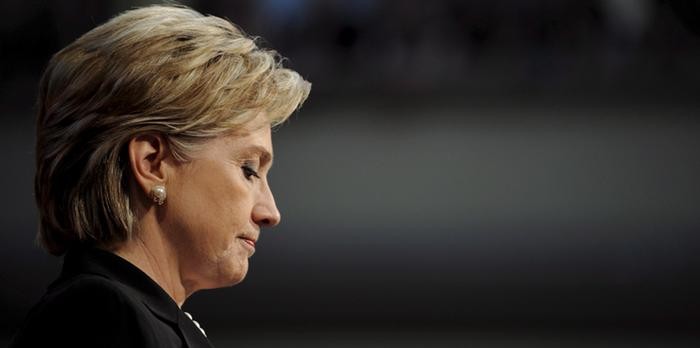PHOTO: Hillary Clinton: “She doesn’t connect with people the way Bill does” (M. Cavanaugh/DPA)
Despite a surge for Donald Trump, with both his confirmed nomination as the Republican candidate and a boost in polls, I still believe that Hillary Clinton is a strong odds-on favorite to win the US Presidency.
In large part, that is because of the flaws of Trump’s aggressive, hate-filled approach to politics. While attracting a committed base of supporters, he has alienated large sections of the American electorate, including many women, African Americans, and Hispanic Americans. Equally important, he has alienated the Republican establishment, which may choose to focus on Congressional races rather than the White House this autumn.
My prediction is also because Clinton will bring experience and a firm approach to the campaign. Despite the test of Bernie Sanders in the Democratic race — and possibly because of it — she will be a tough candidate with a Democratic Party behind her after July’s convention.
That said, Clinton also has a checklist of liabilities, as Michael Knigge writes for Deutsche Welle with a contribution from EA WorldView:
Hillary Clinton’s e-mail scandal and the fact that she can’t seem to lock up the Democratic race against Bernie Sanders are only symptoms, but not the cause of her campaign problems. Here are Clinton’s real liabilities.
Favorability
“One of her top liabilities when we look electorally is her net favorability rating,” said Adam Ramey, a US politics scholar at New York University Abu Dhabi. “Both Donald Trump and Hillary Clinton in both their respective parties have the dishonor of being the least favorably viewed major party candidates in any presidential election since we began gathering data on candidate favorability.”
Clinton is currently viewed unfavorably by 55.8% of Americans, according to the Real Clear Politics polling average. Only 37.6% of respondents have a positive impression of her.
The favorability ratings of presumptive Republican presidential candidate Trump are only slightly worse. The real estate mogul, TV personality and self-declared billionaire is disliked by 58% of those polled, with only 35.4% viewing him positively.
These figures show that many voters, even in her own party, don’t consider Clinton likable or trustworthy. The fact that her Democratic opponent, Bernie Sanders, recently requested a recount of the close primary vote in the state of Kentucky serves as another sign of the deep distrust many liberal activists harbor for Clinton, Ramey contended.
“Her honesty and her trustworthiness is the single biggest issue she faces, and it funnels into everything else,” Ramey said. He added that the email scandal, the debate over the super-delegates pledged to Clinton and her difficulties in closing out the race against Sanders – as well as her problems in dealing with these issues — all relate to the negative perception many Americans have of the likely Democratic nominee.
Part of the Establishment
n an election season marked by populist anger against the so-called establishment, Clinton — a former Secretary of State, senator and first lady — is an easy political target, not just for Sanders, but also for Trump, whom she would face in the general election.
Trump has managed to ride the anti-establishment wave all the way to the Republican nomination. For Clinton, who is considered the personification of the establishment by many, that is a bad sign, because Trump is bound to try to exploit that perception ruthlessly in his campaign.
That Trump has been successful so far in styling himself as an anti-elite candidate and riling up anti-establishment fervor is intriguing – or vexing if you are Clinton – because Trump himself is as establishment and elite a candidate as they come, said Scott Lucas, a professor of International Politics at the University of Birmingham in Britain.
“I think it’s a ruse to say that,” Lucas said. “We have two candidates who are very much inside the establishment, albeit Trump being inside the business establishment whereas Clinton has been inside the political establishment.”
The difference is that Trump has so far been able to convince voters that he does not belong to the establishment. Whether Trump will be able to continue tagging Clinton with that negative label while presenting himself as the anti-establishment candidate could be an important factor in the general election campaign.
Personality
“The big thing is, Hillary just doesn’t connect with people the way that [her husband and former President] Bill did and still does,” Professor Lucas said. “She is very awkward in public, whether it is set-piece campaign appearances or just meeting people.”
Ramey, of NYU Abu Dhabi, said Clinton was widely perceived as “robotic and inauthentic” and that her public appearances leave many people questioning where she really stands on various issues.
“Her husband, Bill, was also a master of following the whims of the time, but the difference is Bill was able to exude this sort of personableness and likability that Hillary has simply not been able to do,” Ramey said.
Meanwhile, Trump — despite or because of his many outrageous statements, his abrasive style and his flip-flops on party affiliation and political issues — is viewed as authentic by many.
“Trump is like bad political jazz. He is just saying what comes into his head,” Lucas said. “It’s going to be interesting to see how this plays out against Clition.”
But it won’t be enough for Clinton to bet that Trump will undermine himself in the general election with his off-the-cuff remarks, Ramey said: “If Hillary wants to have a fighting chance, she will have to exude some sort of human quality and some way to communicate authenticity to the average voter.”

